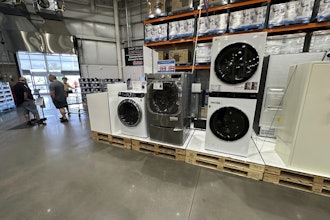The U.S. Bureau of Labor Statistics released its January employment report on Friday, showing that total nonfarm employment increased by 227,000 while the national unemployment rate ticked up one-tenth of a point to 4.8 percent from December as the workforce grew. It was the largest one-month growth since September, and topped 2016's average monthly gain of 187,000.
Factory jobs jumped by 5,000 during January, following a gain of 11,000 in December. Durable goods manufacturing added 6,000 jobs, while nondurable goods manufacturing lost 1,000. The January manufacturing unemployment rate was 4.2 percent, with durable goods at 4.5 percent and nondurable goods at 3.6 percent. January's total nonfarm manufacturing employment was down 46,000 jobs from a year earlier, but has grown by 16,000 over the past two months.
Construction jobs jumped by 36,000 in January, following a flat December. Construction has added 170,000 jobs over the past 12 months.
Construction's January unemployment rate jumped to 9.4 percent, up from December's 7.4 percent. Likewise, January's mining, quarrying and oil extraction unemployment rate was 6.7 percent, up from December's 3.7 percent.
In January durable goods manufacturing:
- Transportation equipment gained 3,000 jobs
- Furniture gained 2,400 jobs
- Nonmetallic mineral products gained 2,200 jobs
- Machinery jobs gained 2,000 jobs
- Fabricated metal products lost 2,200 jobs after gaining 5,800 in December
- Computer and electronics products jobs lost 2,800 jobs
- Wood products, primary metals, electrical equipment and appliances and miscellaneous goods were relatively flat.
In January nondurable goods manufacturing:
- Food manufacturing gained 3,300 jobs
- Printing and related support activities jobs lost 1,600 jobs
- Miscellaneous goods lost 1,400 jobs
- Textile mills, textile product mills, paper and paper products, petroleum and coal products, chemicals and plastics and rubber products were all relatively flat.
Wholesale trade gained 3,000 jobs in January, following December's gain of 2,000 and November's gain of 3,100. Durable goods added 2,000 jobs and nondurable goods added 800.
- Warehousing and storage added 9,400 jobs in January, following December and November's gains of 1,600 and 3,100, respectively.
- Truck transportation lost 1,400 jobs in January.
- Couriers and messengers lost 7,400 jobs in January.
- Building materials and garden supply stores gained 1,500 jobs in January, identical to December.
Wholesale and retail's January unemployment rate was 5.5 percent, up from December's 4.6 percent.
The average factory work week was 40.8 hours in January, with durable goods at 41.2 and nondurable goods at 40.0. Wholesale trade and warehousing were at 38.9 hours each. Average factory overtime hours were 3.2 in January.






















